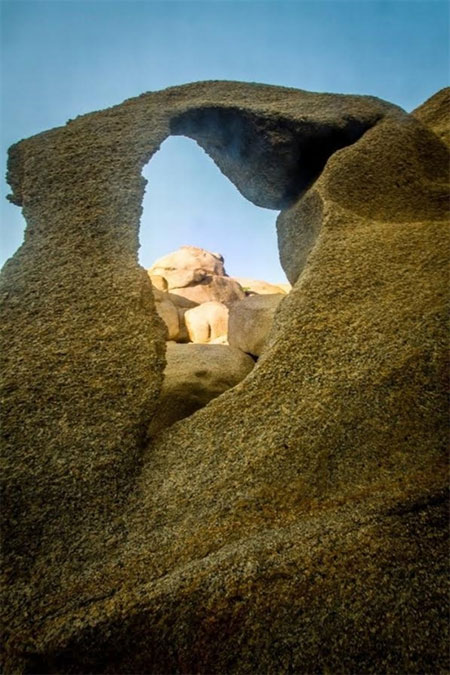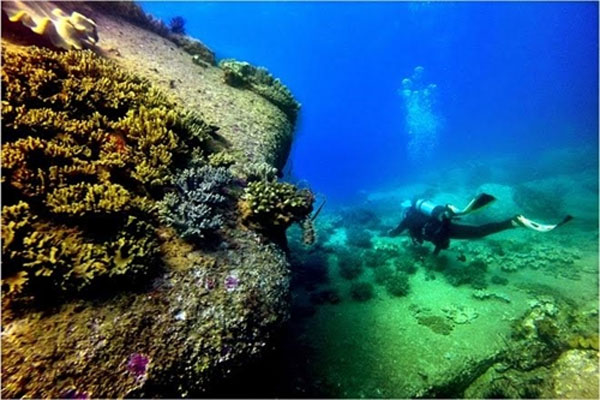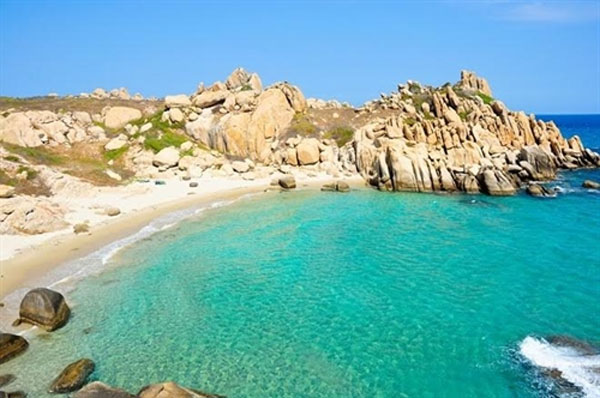Visiting the pristine wild nature of Cau Island
 |
| Weird rocks: The unique rock formations of the Ba Hon Cave. - File Photo |
Cau Island, also known as Cu Lao Cau or Hon Cau in Vietnamese, is located in Tuy Phong Commune, Binh Thuan Province, 110km from Phan Thiet City in the northeast. The island is 10km off the mainland, and is 1.5km long and less than 800m in width.
The wind here is cooler than in other areas. The vast ocean is enchanting with its crystal clear deep blue water. The greenery barely covers the island due to a lack of rain. There are only a few casuarina trees, green bushes and vines. Despite periods of six months without rain, the plants here persist and come to bloom, revealing their exquisite beauty.
During the rainy season, the island’s landscape becomes a smooth green like a golf course surrounded by ocean. During the dry season it is different, however the plants still bravely hold onto life.
The most populous reptile species here are the butterfly lizard and snakes, including venomous species. There are far fewer venomous snakes now than in the past, but prevention is better than cure. When walking on the island, especially at night, put on your shoes and a pair of full-length trousers. The snakes will not bite unless they are threatened.
A day on Cu Lao Cau
 Biodiversity: Cu Lao Cau is famous for its coral reefs and patches of sea grass, which serve as the habitat and egg laying site for many precious marine species. - File Photo |
|
|
Cau is a very small island, so one can easily explore the whole island on foot within a day. To have the best experience, you’d better contact Mr Tu Huu, a well-known local who knows everything about Cu Lao Cau. He will be happy to become your tour guide.
Enjoying the beach
Bai Tien (Fairy Beach) is considered the most beautiful beach according to locals here. In front of one’s eyes is a gorgeous landscape rich with colours. The silver white crests of the waves travel above the deep blue ocean surface. To the right, a vast area is covered with lush green grass punctuated with a few rocks.
On Cu Lao Cau, besides enjoying the sandy beach with crystal clear water or the rock pools of all shapes and sizes that surround the island, one can explore many other interesting things.
See the coral
A special biological feature of Hon Cau is that the surrounding water possesses a tropical marine ecosystem that includes coral reefs and patches of sea grass. They not only bring eco-diversity but also serve as the habitat and egging laying site for many precious marine species. Thus, Cu Lao Cau is one of the best places in Viet Nam for anyone that wants to feast their eyes on natural coral reefs.
On Cu Lao Cau, the coral reefs are well preserved. Only a few metres from the shore is already enough to allow you to take a closer look at the colourful reefs and the schools of fish joyfully twisting and turning in all directions. A piece of advice to any swimmer or diver is to bring along a pair of sandals to avoid cutting your feet on oyster shells.
Yen Cave and Ba Hon
There is a special cave where hundreds of swifts nest. Before, the local fishermen and hunters usually came here for the swifts’ nests and eggs, but now under the protection of border patrols, the swifts flourish.
Right next to Yen Cave (Swift Cave) is Ba Hon Cave created by three huge rocks of such strange shapes that anyone visiting Cau Island has to take a photo here.
Nam Hai Temple
The Nam Hai God Worship Temple is a sacred place for local fishermen, who believe the god has saved their lives many times when they have got into trouble at sea. No one knows who built the temple or when the customs and faith in the sea god came about, but they have been solemnly preserved and passed down through the generations for centuries. The biggest ceremony occurs annually at the Nam Hai Temple on the 15th and 16th of April in the lunar calendar.
Delicious seafood
There are two restaurants on the island that are always open. One of them is the Ocean Wave owned by Mr. Tu Huu, and is famous for its delicious dishes.
Snails are a specialty here, sold at the very cheap price of VND50,000/kg. Also found here are moon crabs, a species with white spots on its shell that is said to be even more delicious than king crabs, and much cheaper.
A final specialty are the scallops topped with crushed peanuts, a dish unique to Cu Lao Cau that every visitor must try.
When to visit?
The best time to visit Cu Lao Cau is from April to August in the lunar calendar, when the southern wind comes to calm the ocean, though recently there have still been storms during this period. Some tourists that are seeking more adventure visit the island during winter, from August to March in the lunar calendar, which comes with strong winds. Storms coming from the ocean with strong winds can make it difficult to travel to the island during this time.
Staying on the island
Cu Lao Cau is under the management of the border patrol, so if you want to stay on the island overnight, you must ask them for permission.
Moreover, there is no accommodation on the island, so interested campers must bring along sleeping bags, tents and everything else they might need, or ask to stay for a night at the border patrol station. All the patrols are friendly and helpful. Normally, people visit the island during the day and return to the mainland in the afternoon.
There is an abundance of seafood in the waters around the island, so if anyone is up for more adventure, he or she can bring along a fishing rod or go hunting for crabs to make a supper on the beach before sleeping on the island. Nothing compares to sitting around a bonfire on a sandy beach enjoying seafood soup of one’s own creation. If that sounds like too much work, a wide variety of seafood is sold by locals at very attractive prices.
A day on Cu Lao Cau can help to melt away all the stress and pressures of daily life.
What the stars mean:
★ Poor ★ ★ Promising ★★★ Good ★★★★ Very good ★★★★★ Exceptional
Latest News
More News
- Manila becomes a new check-in destination for Vietnamese youth (December 11, 2025 | 18:07)
- Vietjet launches mega year-end ticket promotion (December 10, 2025 | 11:33)
- Dalat leads Vietnam’s 2025 search trends (December 09, 2025 | 13:44)
- Vietnam welcomes record wave of international visitors (December 09, 2025 | 13:43)
- Vietjet launches daily Manila flights to celebrate year-end festive peak season (December 05, 2025 | 13:47)
- The destinations powering Vietnam’s festive season travel demand (December 04, 2025 | 18:33)
- Vietnam named among the world’s most exciting winter destinations (December 04, 2025 | 15:10)
- Phu Tho emerges as northern Vietnam’s new tourism hub (December 01, 2025 | 17:00)
- Vietjet completes Airbus A320/A321 updates ahead of deadline (December 01, 2025 | 09:49)
- Vietjet resumes Con Dao flights from early December (November 28, 2025 | 15:24)

















 Mobile Version
Mobile Version